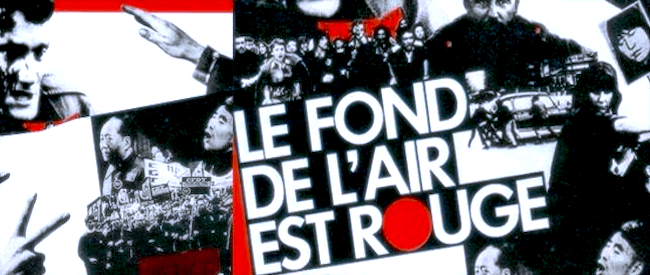
A GRIN WITHOUT A CAT
(Scenes from the Third World War 1967-1977)
aka LE FOND DE L’AIR EST ROUGE (The Base of the Air Is Red)
Dir. Chris Marker, 1977/1992
France, 180 min. (in two parts with a break in the middle)
In French, English, German, Japanese, Russian, Czech, Spanish, and more with English subtitles.
Special thanks to Icarus Films.
SATURDAY, FEBRUARY 11 – 3 PM
SATURDAY, FEBRUARY 18 – 3 PM
SATURDAY, FEBRUARY 25 – 1:30 PM
TUESDAY, FEBRUARY 28 – 7:30 PM
A GRIN WITHOUT A CAT is Chris Marker’s epic film-essay on the worldwide political wars of the 60’s and 70’s: Vietnam, Bolivia, May ’68, Prague, Chile, and the fate of the New Left.
The original French title is roughly translatable as “The Base of the Air is Red,” referring to the high hopes of the radicals at the time built on a foundation of air. Released in France in 1978, restored and “re-actualized” by Marker fifteen years later (after the fall of the Soviet Union), A GRIN WITHOUT A CAT is a masterpiece. Described by Marker as “scenes of the Third World War,” the film is divided into two parts, each weaving together two strands:
Part 1: Fragile Hands
1. From Vietnam to Che’s death
2. May 1968 and all that
Part 2: Severed Hands
1. From Spring in Prague to the Common Program of Government in France
2. From Chile to – to what?
From 1967 (the year Marker argues was the real turning point) on, A GRIN WITHOUT A CAT is a sweeping, global contemplation of a defining ten years’ political history.
“A film without a dogma, celebrating the promise of socialist ideas (the grin) while realizing that the brave new world they envision (the cat) remains elusive and intangible as its twentieth-century trial runs slip farther into the past… On a deeper level, A GRIN WITHOUT A CAT is an essay on historical memory itself.” —David Sterritt, Cineaste
“No scan of Marker’s redoubtable career achievement is complete without strapping oneself to this restless behemoth of a historical documentary… Along the way, Marker is a master weaver of colliding perspectives, forgotten stories and unanswered questions… the poetic questions he raises are never less than stunning.” —Michael Atkinson, Sight & Sound
“Much more than a weapon, more than a history lesson intended to provoke our revolutionary consciousness, this feature film is the result of lucid reflection and profound honesty.” — Michel Perez, Le Matin, November 25, 1977
“A beautiful poem in red, luminous with sensitivity and intelligence.” — Serge Richard, L’Unité, December 9, 1977
“This film is a mirror held up to each of us, a mirror that wanders through all the paths that we have taken or crossed (Vietnam war protests, pro-Latin America movement, May of ’68, the rise and fall of the Left) and encourages us to reflect along with it about the journey and its goal.” — Regis Debray, Rouge, December 28, 1977
“Image, imaginary, imagination, imagery… and revolution. Chris Marker delves into his enormous reservoir of images from the past ten years, both official and candid, sorts, selects, puts them into perspective, in context, into opposition, and by allowing us to re-see, to re-read our recent past, attempts to imagine the future.” — Alain Remond, Telerama, December 3/9, 1977
“A trial for the viewer: One cannot absorb four hours of so much history, kneaded, tormented, perpetually reexamined, without wondering if the end of the world is not near. To interpret the film in that way would be to betray its meaning, and that is where Chris Marker’s work becomes somewhat like a mirror held up to our awareness: not a traditional humanist awareness, but an active awareness. That is where progressivism regains meaning. And especially, that is where film now asserts itself as the possible and practically indispensable tool of awareness, to put back into perspective so many dashed hopes, so many betrayals.” — Louis Marcorelles, Le Monde, November 5, 1977
“Fifteen years later, his work as a filmmaker has the density of a Pierre Bourdieu sociological survey or a Fernand Braudel historical opus… In this thoughtful exercise in style, A GRIN WITHOUT A CAT teems with lost illusions, but no errors. Finally, Chris Marker’s film is being used rather than abused. The reason undoubtedly resides in this little phrase slipped into the second episode: ‘You never know what you’re filming. Until years later.’ In 1993, A GRIN WITHOUT A CAT accomplishes the tour de force of avoiding three potential pitfalls. It is not a likable witness to times past; it is not a summation, and still less the act of contrition of a lost generation. It is all about memory and social anthropology.” — Michel Chemin, Libération, April 1993
